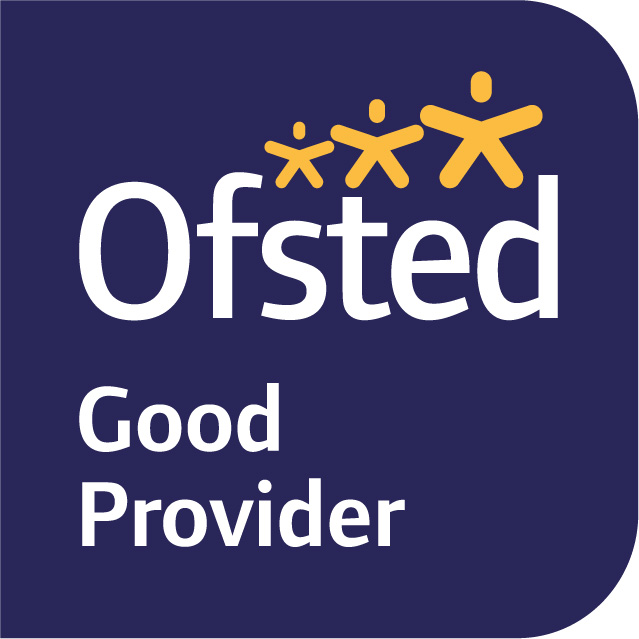This website uses cookies so that we can provide you with the best user experience possible. Cookie information is stored in your browser and performs functions such as recognising you when you return to our website and helping our team to understand which sections of the website you find most interesting and useful.
Education & Childcare
Childcare & Education Apprenticeship
With the ability to study this course at a variety of levels from levels 2 to 3 all the way up higher education these courses certainly provide the opportunities for progression. With a large focus on real world learning environments accompanying links with local employers these courses may just be the right fit to ensure you work with the school, nursery, education or care provider of your choosing. And if teaching is the ultimate goal then see how far this educational pathway will take you.
Take a look at the Virtual tour of our campuses and facilities here.
Education provider.
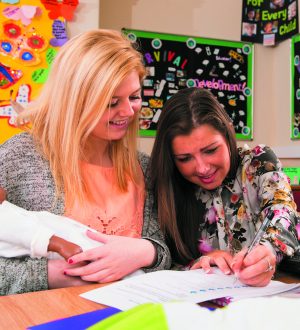
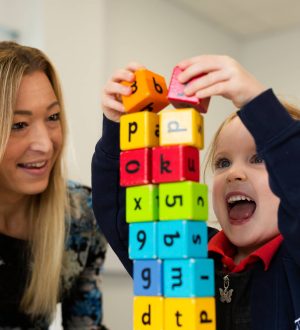
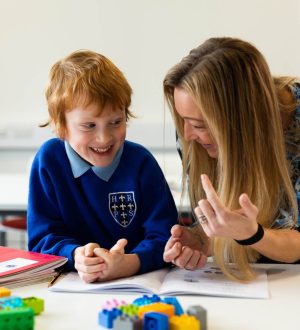
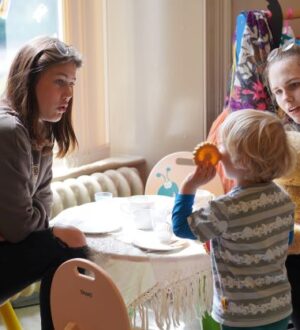
Available courses
Level 3 Teaching Assistant Apprenticeship
- Course type: Apprentices, 16-18, Adults
- Study Type: Apprenticeship
- Study Duration: 12-15 months
- Level: Level 3
- Campus: Leek, Buxton
- Six start dates throughout the year
-
Tell me about the course
An apprenticeship is a practical, work-related course, designed to allow you to learn whilst you earn. This programme is suitable for school leavers and mature students, who have a keen interest in creating an environment in which children and young people can thrive, and wish to pursue a career through on-the-job training.
The Level 3 Teaching Assistant Apprenticeship is designed to provide you with the skills and understanding required to support the class teacher in ensuring pupils understand the work set, know their learning objectives and stay on task. Following completion of this apprenticeship, you could look forward to a career as an Assistant Teacher, Classroom Assistant, Learning Support Assistant, Learning Support Worker or Teaching Assistant.
Your training will include the following knowledge and skill sets:
- Using learning resources to support leaners.
- Using up to date technology safely, to support learning.
- Understanding legislation, guidance, and procedures for Prevent, safeguarding and health & safety.
- Using teaching strategies to deliver learning activities and interventions, for example, scaffolding and open questioning.
- Adapting communication strategies to suit the audience and context.
- Supporting learner’s well-being, mental health and pastoral needs, including referral to other professionals or services if required.
- Building relationships with learners, teachers, other professionals and stakeholders.
- How the curriculum is implemented and its intended impact.
- Observing, recording and reporting on learners in line with organisational procedures.
- Providing feedback to learners.
In addition, you will develop a full range of professional behavioural skills, including being a positive role model, working collaboratively with and being respectful to the whole school community and promoting equality, diversity, and inclusion.
You will learn in a real-world environment and be assigned an instructor-mentor who will provide all the guidance and support you need to succeed. You will also have the support of workplace mentors who will provide you with a wealth of company knowledge and experience. In addition to on-the-job training, you will undertake learning and development using online learning materials and you will build an online portfolio of evidence. You will also take part in regular sessions in college where you will meet up with other apprentices, from varying levels of experience, to share your personal experiences and reflect on your learning journey.
At BLC we offer an enhanced student experience with the opportunity to take part in enrichment activities, such as, industry conferences, connecting with guest speakers and job swaps within your workplace or with other apprentices to give you experience working in different situations.
-
WHAT QUALIFICATIONS WILL I GET?
Level 3 Teaching Assistant
-
What can I go onto next?
You could progress on to;
- employment as a Teaching Assistant in a variety of settings including primary, secondary, special schools, alternative provision, and further education institutions such as sixth forms and colleges,
- a foundation degree course,
- or further related CPD training, such as, Understanding Autism, Asperger’s and ADHD, Neuroscience in the Early Years or Children and Young people’s Mental Health and more.
-
How Will I be Assessed?
End-point assessment (EPA) is the final stage of an apprenticeship. This is an impartial assessment, carried out by an independent body, and will assess your development of the skills, knowledge and behaviours outlined in the apprenticeship standard. It may include a portfolio of evidence, an online multiple-choice test, workplace observation and professional discussion.
-
Entry requirements
You will, ideally, have a minimum of GCSE Grades 4/C in maths and English, or Level 2 Functional Skills in maths and English.
There are no further qualification requirements, however, you will undertake an initial assessment to ensure this apprenticeship is right for you.
As this programme will involve working with children, you will be required to take a disclosure and barring service (DBS) check.
You must have the right to work in the UK and have been residing in the UK for the prior 3 years.
Level 2 Early Years Practitioner Apprenticeship
- Course type: Apprentices
- Study Type: Apprenticeship
- Level: Level 2
- Campus: Leek, Buxton
- Six start dates throughout the year
-
Tell me about the course
An apprenticeship is a practical, work-related course, designed to allow you to learn whilst you earn. This programme is suitable for school leavers and mature students, who have a keen interest in creating an environment in which young children can thrive, and wish to pursue a career through on-the-job training.
The Level 2 Early Years Practitioner (EYP) Apprenticeship is designed to provide you with the skills, knowledge and understanding to provide care and education for children from birth to 7 years of age. Following completion of this apprenticeship, could look forward to a career as an Assistant Childminder, Early Years Practitioner, Nanny, Early Years Worker, Nursery Assistant, Nursery Nurse or Nursery Practitioner.
You will gain the knowledge required to be a competent EYP and your training will include the following skills:
- Supporting babies and young children through a range of transitions e.g., moving onto school, moving house or the birth of a sibling.
- Recognising when a child is in danger, at risk of serious harm or abuse and explain the procedures to be followed to protect them.
- Identify risks and hazards, to children and adults, in the work setting and during off site visits and encouraging children to be aware of personal safety, and the safety of others.
- Understanding the prevention and control of infection, including hand washing, food preparation and hygiene, dealing with spillages safely, safe disposal of waste, using correct personal protective equipment. Encouraging children to develop personal hygiene practices (including oral hygiene).
- Promoting health and wellbeing by encouraging babies and young children to consume healthy and balanced meals, snacks and drinks appropriate for their age, and be physically active through planned and spontaneous activity throughout the day, both indoors and outdoors.
- Carrying out respectful care routines appropriate to the development, stage, dignity and needs of the child, including eating (feeding and weaning/complimentary feeding), nappy changing procedures, potty/toilet training, care of skin, teeth and hair, and rest/sleep provision.
- Communicating with all children in ways that will be understood, including verbal and non-verbal communication and encourage babies and young children to use a range of communication methods and support early language development.
- Working with colleagues to identify and plan enabling environments, activities (both indoors and outdoors), play opportunities and educational programmes (both adult led and child initiated) to support children’s holistic development through a range of play, creativity, social development and learning. Then implementing and reviewing these activities.
- Observing and assessing children, then sharing results accurately and confidentially in line with expected statutory framework and setting’s requirements.
- Supporting children’s early interest and development in mark making, reading and mathematical learning.
- Working alongside parents and/or carers, recognising their role in the baby’s/child’s health, well-being, learning and development, and providing support and encouragement.
In addition, you will develop a full range of professional behavioural skills, including the ability to work as a team, and demonstrate compassion, trustworthiness and integrity.
You will learn in a real-world environment and be assigned an instructor-mentor who will provide all the guidance and support you need to succeed. You will also have the support of workplace mentors who will provide you with a wealth of company knowledge and experience. In addition to on-the-job training, you will undertake learning using online resources and you will build an online portfolio of evidence. You will also take part in regular sessions in college where you can meet up with other apprentices, from varying levels of experience, to share your personal experiences and reflect on your learning journey.
At BLC we offer an enhanced student experience with the opportunity to take part in enrichment activities, such as, industry conferences, connecting with guest speakers and job swaps within your workplace or with other apprentices to give you experience working in different situations.
-
What qualifications will I get?
Level 2 Early Years Practitioner
-
What can I go onto next?
You could progress on to;
- employment as an Early Years Practitioner (EYP) within Day Nurseries, Nursery Schools, Nursery units, Pre-school/ Playgroup settings, School Receptions Class and Forest Schools,
- a Level 3 Early Years Educator Apprenticeship or Level 3 Diploma in Early Years Workforce (Early Years Educator),
- or further related CPD training, such as, PREVENT, Safeguarding, Understanding Autism, Asperger’s and ADHD, Neuroscience in the Early Years or Children and Young people’s Mental Health and more.
-
How will I be assessed?
End-point assessment (EPA) is the final stage of an apprenticeship. This is an impartial assessment, carried out by an independent body, and will assess your development of the skills, knowledge and behaviours outlined in the apprenticeship standard. It may include an online multiple-choice test, workplace observation and a professional discussion.
-
Entry requirements
You will, ideally, have GCSE Grades 4/C in maths and English, or a minimum Level 1 Functional Skills in maths and English. If you don’t already meet the minimum GCSE requirements, you will need to have gained Level 2 Functional Skills before you complete this apprenticeship.
There are no further qualification requirements, however, you will undertake an initial assessment to ensure this apprenticeship is right for you.
As this programme will involve working with children, you will be required to take a disclosure and barring service (DBS) check.
You must have the right to work in the UK and have been residing in the UK for the prior 3 years.
Level 3 Early Years Educator Apprenticeship
- Course type: Apprentices, Adults, 16-18
- Study Type: Apprenticeship
- Study Duration: 15-18 Months
- Level: Level 3
- Campus: Buxton
- Six start dates throughout the year
-
Tell me about the course
An apprenticeship is a practical, work-related course, designed to allow you to learn whilst you earn. This programme is suitable for school leavers and mature students, who have a keen interest in creating an environment in which young children can thrive, and wish to pursue a career through on-the-job training.
The Level 3 Early Years Educator Apprenticeship is designed to provide you with the skills and understanding to provide care and education to children from birth to 7 years of age. Following completion of this apprenticeship, could look forward to a career working in Day Nurseries, Nursery Schools, Nursery units, Pre-school/ Playgroup settings, School Receptions Class and Forest Schools.
In addition to learning how to provide a safe and healthy learning/working environment, and how to meet the basic care and developmental needs of young children, your training will include the following knowledge and skill sets:
- Underpinning theories and philosophical approaches to how children learn and develop, and their influence on practice.
- Systematic synthetic phonics in the teaching of reading, and a range of strategies for developing early literacy and mathematics.
- Current early education curriculum requirements such as the Early Years Foundation Stage.
- Recognising when a child is in need of additional support, such as, where a child’s progress is less than expected, and how to assess this within the current early education curriculum framework using a range of assessment techniques.
- How to respond to accidents, injuries and emergency situations.
- Engage in effective strategies to develop and extend children’s learning and thinking, including sustained shared thinking.
- Model and promote positive behaviours expected of children, such as, turn taking, and keeping reactions and emotions proportionate.
- Carrying out and recording observational assessment accurately.
- Discussing children’s progress and planning next stages in their learning with their key person, parents and/or carers.
In addition, you will develop a full range of professional behavioural skills, including being team focused, demonstrating compassion, trustworthiness and integrity, and working in a non-discriminatory way in accordance with fundamental British values.
You will learn in a real-world environment and be assigned an instructor-mentor who will provide all the guidance and support you need to succeed. You will also have the support of workplace mentors who will provide you with a wealth of company knowledge and experience. In addition to on-the-job training, you will undertake learning and development using online learning materials and you will build an online portfolio of evidence. You will also take part in regular sessions in college where you will meet up with other apprentices, from varying levels of experience, to share your personal experiences and reflect on your learning journey.
At BLC we offer an enhanced student experience with the opportunity to take part in enrichment activities, such as, industry conferences, connecting with guest speakers and job swaps within your workplace or with other apprentices to give you experience working in different situations.
You will also complete the Level 3 Award in Paediatric First Aid (RQF) or Level 3 Award in Emergency Paediatric First Aid (RQF), in order to meet the EYFS requirement.
-
What qualifications will I get?
Level 3 Early Years Educator
-
What can I go onto next?
You could progress on to;
- employment as an Early Years Educator with a license to practice in Nursery Schools, Pre-school/ Playgroup settings, School Receptions Class and Forest Schools,
- a Foundation Degree course at Buxton & Leek College,
- or further related CPD training, such as, Understanding Autism, Asperger’s and ADHD, Neuroscience in the Early Years or Children and Young people’s Mental Health and more.
-
How will I be assessed?
End-point assessment (EPA) is the final stage of an apprenticeship. This is an impartial assessment, carried out by an independent body, and will assess your development of the skills, knowledge and behaviours outlined in the apprenticeship standard. It may include an online multiple choice test, workplace observation and professional discussion.
-
Entry requirements
You will, ideally, have GCSE Grades 4/C in maths and English, or a minimum Level 2 Functional Skills in maths and English.
There are no further qualification requirements, however, you will undertake an initial assessment to ensure this apprenticeship is right for you.
As this programme will involve working with children, you will be required to take a disclosure and barring service (DBS) check.
You must have the right to work in the UK and have been residing in the UK for the prior 3 years.
Level 5 Early Years Lead Practitioner
- Course type: Apprentices
- Study Type: Apprenticeship
- Study Duration: 24 to 32 months
- Level: Level 5
- Campus: Workplace, Leek, Buxton
- Six start dates throughout the year
-
Tell me about the course
This occupation is found in a range of settings which can include day nurseries, playgroups, nursery schools, pre-schools, kindergartens, primary schools, hospitals, social care settings, out of school environments and local authority provision. The broad purpose of the occupation is to be a proactive and influential practitioner, working directly with children, skilfully leading day to day practice at an operational level. As active practitioners they are effective role models of play based learning, supporting others to develop their own practice. They are highly skilled professionals who take an operational lead for the care, learning and development of all young children within their care, adapting to individual needs providing inclusive and holistic provision. They engage with sector developments both locally and nationally, with a commitment to developing their own professional and educational competencies.. In their daily work, an employee in this occupation interacts with children aged birth to eight years.
Course delivery
There will be 12 group sessions consisting of 8 webinars and 4 on-campus sessions over 18-24 months. In addition, there will be regular workplace visits and 1-2-1’s with your college Instructor-Mentor.
-
WHAT QUALIFICATIONS WILL I GET?
Level 5 Early Years Lead Practitioner
This is a nationally recognised apprenticeship standard.
-
What can I go onto next?
Job roles for Early Years Lead Practitioner could include Assistant, Deputy or Duty Manager, Team, Room or or Play Lead/Coordinator or other similar job titles. This qualification could lead into specialist roles such as Specialist Practitioner in Child Development, Welfare Officer or Specialist Educational Needs Coordinator (SENco).
Achievers of this apprenticeship may also wish to pursue a degree in a related subject.
-
How Will I be Assessed?
End-point assessment (EPA) is the final stage of an apprenticeship. This is an impartial assessment, carried out by an independent body, and will assess your development of the skills, knowledge and behaviours outlined in the apprenticeship standard. It may include a portfolio of evidence, an online multiple-choice test, workplace observation and professional discussion.
-
Entry requirements
Minimum level 2 Maths & English or equivalent.
You should have a related level 3 qualification or have proven workplace experience at this level.
You will need a suitable placement.
You will need to complete a DBS check, your employer will do this, this will allow you to work with children.
You must have the right to work in the UK and have been residing in the UK for the prior 3 years.
Level 3 Learning and Skills Assessor
- Course type: Apprentices
- Study Type: Apprenticeship
- Study Duration: 15 - 18 Months
- Level: Level 3
- Campus: Buxton, Leek
- 6 start dates throughout the year
-
Tell me about the course
An apprenticeship is a practical, work-related course, designed to allow you to learn whilst you earn. This programme is suitable for those with industry experience, who are looking to develop their role to enable them to assess candidates against agreed standards of competence, and wish to pursue a career through on-the-job training.
The Level 3 Learning and Skills Assessor Apprenticeship is designed to provide you with the understanding required to support the progression of learners by providing feedback of assessment decisions, setting realistic learning goals and referring to other professionals if required. Following completion of this apprenticeship, you could progress on to become an Assessor or Training Facilitator within your workplace.
You will gain a wealth of knowledge and skills relevant to assessing vocational learners, including:
- The role of the assessor working within organisational, legal, and ethical frameworks, including confidentiality and safeguarding.
- How to plan inclusive assessment and the different methods of assessment.
- Methods of verbal and non-verbal communication to support assessment practice, including questioning techniques.
- How to give constructive feedback for the purpose of progress and achievement.
- Organisational and legal requirements for recording, storing and sharing personal information.
- Developing and maintaining records of assessment, complying with quality, confidentiality and data protection requirements.
In addition, you will develop a full range of professional behavioural skills, including maintaining an impartial approach, encouraging mutual respect, and demonstrating resilience and adaptability when dealing with challenges.
You will learn in a real-world environment and be assigned an instructor-mentor who will provide all the guidance and support you need to succeed. You will also have the support of workplace mentors who will provide you with a wealth of company knowledge and experience.
In addition to on-the-job training, you will undertake learning and development using online learning materials to build an online portfolio, and will take part in regular sessions in college where you can meet up with other apprentices to share your personal experiences and reflect on your learning journey.
-
What qualifications will I get?
Level 3 Learning and Skills Assessor
-
What can I go onto next?
You could progress on to employment as an Assessor or Training Facilitator in a variety of sectors including healthcare, military, manufacturing, production, business and professional, education, leisure, construction, creative, technology.
-
How will I be assessed?
End-point assessment (EPA) is the final stage of an apprenticeship. This is an impartial assessment, carried out by an independent body, and will assess your development of the skills, knowledge and behaviours outlined in the apprenticeship standard. It may include a portfolio of evidence, workplace observation and professional discussion.
-
Entry requirements
You will, ideally, have GCSE Grades 4/C in maths and English, or a minimum Level 2 Functional Skills in maths and English.
There are no further qualification requirements, however, you will need to be in a position to have a candidate to assess.
You must have the right to work in the UK and have been residing in the UK for the prior 3 years.
Level 4 Learning and Skills Mentor
- Course type: Apprentices
- Study Type: Apprenticeship
- Level: Level 4
- Campus: Buxton, Leek
- 6 start dates throughout the year
-
Tell me about the course
An apprenticeship is a practical, work-related course, designed to allow you to learn whilst you earn. This programme is suitable for those with industry experience, who are looking to support individuals and groups with their learning and development, and wish to pursue a career through on-the-job training.
The Level 4 Learning and Skills Mentor Apprenticeship is designed to provide you with the understanding required to support learners of all ages, and all levels, to develop within a new work role. Following completion of this apprenticeship, you could progress on to become a Vocational Mentor, Occupational Mentor, Technical Mentor or Training Mentor within your workplace.
You will gain a wealth knowledge and skills relevant to the role of a mentor, including:
- The roles and responsibilities of a mentor, understanding the organisational and professional boundaries, legal and ethical requirements, including safeguarding.
- How to plan, conduct, record and review mentoring sessions.
- Methods of communication to maintain the mentoring relationship and review progress towards agreed outcomes, with a non-judgemental and objective approach.
- How to provide accurate and relevant vocational/pastoral advice and guidance to meet mentee needs, including points of referral to other professional services.
- Organisational and legal requirements for recording, storing and sharing personal information.
- Theories and models of evaluation and reflection to support mentee development
In addition, you will develop a full range of professional behavioural skills, including working to ethical and legal standards, encouraging mutual respect, and demonstrating resilience and adaptability when dealing with challenges.
You will learn in a real-world environment and be assigned an instructor-mentor who will provide all the guidance and support you need to succeed. You will also have the support of workplace mentors who will provide you with a wealth of company knowledge and experience.
In addition to on-the-job training, you will undertake learning and development using online learning materials to build an online portfolio, and will take part in regular sessions in college where you can meet up with other apprentices to share your personal experiences and reflect on your learning journey.
-
What qualifications will I get?
Level 4 Learning and Skills Mentor
-
What can I go onto next?
You could progress on to work as a learning and skills mentor in a variety of sectors including healthcare, military, manufacturing, production, business and professional, education, leisure, construction, creative, technology.
-
How will I be assessed?
End-point assessment (EPA) is the final stage of an apprenticeship. This is an impartial assessment, carried out by an independent body, and will assess your development of the skills, knowledge and behaviours outlined in the apprenticeship standard. It may include a portfolio of evidence, workplace observation and professional discussion.
-
Entry requirements
You will, ideally, have GCSE Grades 4/C in maths and English, or a minimum Level 2 Functional Skills in maths and English.
There are no further qualification requirements, however, you will need to be in a position to have a candidate or group to mentor.
You must have the right to work in the UK and have been residing in the UK for the prior 3 years.
Level 5 Learning & Skills Teacher (LST) Apprenticeship
- Course type: Apprentices, Adults, Higher Education
- Study Type: Apprenticeship
- Study Duration: Typically, 24 months
- Level: Level 5
- Campus: Workplace, Leek, Buxton, Derby
- There are six start dates throughout the year
-
Tell me about the course
An apprenticeship is a practical, work-related course, designed to allow you to learn whilst you earn. This programme is suitable for teachers who want to develop their pedagogical practice with learners aged 14+, and wish to pursue a career through on-the-job training.
A Learning and Skills Teacher (LST) is a dual professional, having achieved competence in a vocation or subject specialism, and then subsequently trained as a teacher. Many teachers in this sector begin teaching as a second, or later career. Their role is pivotal to the success of traineeships, apprenticeships, vocational education and training, meeting both learners’ and employers’ needs.
The Level 5 Learning and Skills Teacher (LST) Apprenticeship is designed to provide you with the skills and understanding required to teach young people and adults within the Education and Training Sector, including work-based training, further and higher education, offender learning and the voluntary sector.
You will develop the comprehensive range of knowledge and skills required to undertake the role of a LST and this will include:
- The pedagogical theory and how to apply this theory to practice.
- The principles of designing, planning, and organising curriculum.
- Coaching/mentoring principles and techniques.
- Promoting a passion for learning and high expectations for all students.
- Using a variety of teaching and assessment methods depending on the learning environment and learners’ needs.
- Demonstrating, through teaching, the wider context (policy, economic, societal, technological, legal, cultural and environmental) of the subject, recognising the implications for professional practice.
- Using the results of initial and diagnostic assessment to plan learning and differentiated support at the start of and throughout the learners’ journey.
- Complying with internal and external regulations, legislation and guidance, in relation to teaching, learning and assessment, and recording, storing and sharing information relating to learners.
- Ensuring the physical, psychological, and social wellbeing of students.
- Managing workload through preparation and prioritisation, time management, and responsiveness to change.
- Using up to date digital and online technologies to improve teaching, learning and assessment.
In addition, you will develop a full range of professional behavioural skills, including being a positive role model, being adaptable when dealing with challenges, maintaining focus and self-control, and promoting equality, diversity, and inclusion.
You will learn in a real-world environment and be assigned an instructor-mentor who will provide all the guidance and support you need to succeed. You will also have the support of workplace mentors who will provide you with a wealth of company knowledge and experience. In addition to on-the-job training, you will undertake learning and development using online learning materials and you will build an online portfolio of evidence. You will also take part in regular sessions in college where you will meet up with other apprentices, from varying levels of experience, to share your personal experiences and reflect on your learning journey.
At BLC we offer an enhanced student experience with the opportunity to take part in enrichment activities, such as, industry conferences and visits from guest speakers.
-
What qualifications will I get?
Level 5 Learning and Skills Teacher (LST)
CertEd (Certificate in Education)
-
What can I go onto next?
This apprenticeship is a nationally recognised teaching qualification in the lifelong learning sector and provides an appropriate foundation from which to on to;
- academic and higher-level qualifications,
- or employment as an Education Practitioner, FE Learning and Skills Teacher, Learning and Skills Practitioner, Lecturer or Tutor.
-
How will I be assessed
End-point assessment (EPA) is the final stage of an apprenticeship. This is an impartial assessment, carried out by an independent body, and will assess your development of the skills, knowledge and behaviours outlined in the apprenticeship standard. It may include a portfolio of evidence, an online multiple-choice test, workplace observation and professional discussion.
-
Entry Requirements
You will need a minimum of GCSE Grades 4/C, or Level 2 Functional Skills, in maths and English.
You will also need to be employed in a trade/industry related to the apprenticeship with a minimum of 30 hours of teaching and responsibility for preparing, delivering and assessing, in a suitable setting, with a mentor who is a qualified teacher or lecturer.





